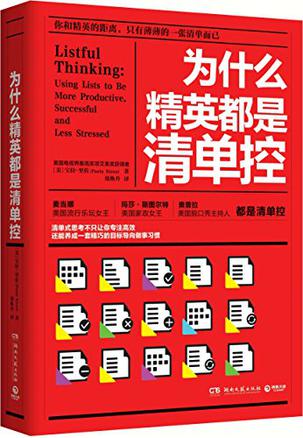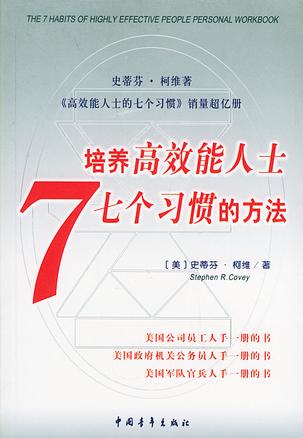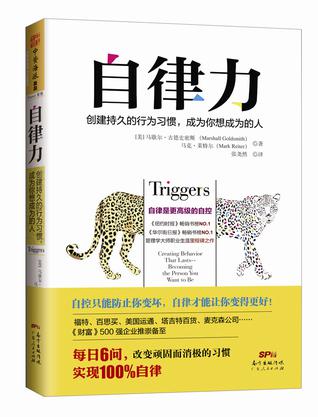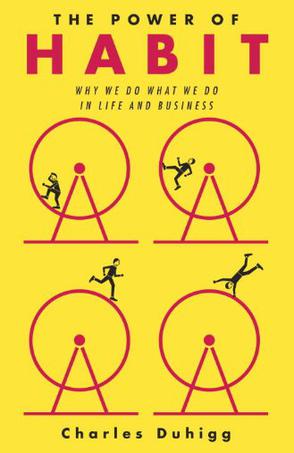-

为什么精英都是清单控
为何有些人事情不多,却手忙脚乱? 而有人身兼数职,仍从容不迫,还可放空休息? 原来,精英都习惯用——“清单式思考”。 麦当娜、玛莎•斯图尔特、约翰•列侬、富兰克林、里根、达•芬奇、爱迪生和奥普拉,这些不同时代、不同领域的成功人士有何共同点?答案是:他们都是“清单控”。他们习惯把该做、想做的事,变成可快速浏览、方便执行的“清单”。 我们只要将目标写下来,便成为一种应负的责任,帮助我们完成想做的事。“清单控”之所以比别人顺遂,是因为光是“列清单”这个动作,就能发挥强大效应: ◎立刻减轻焦虑、快速建立成就感; ◎备忘,重点不遗漏; ◎专注大局,忽略枝节,复杂任务简化处理; ◎重要的事自动完成,日子愈过愈惬意。 “清单化”的威力在于,它不是时间管理工具,而是一套精巧的目标导向做事习惯。一个目标、一张清单,目标不论大小都行,工作与生活都适用。 -

培养高效能人士7个习惯的方法
《培养高效能人士七个习惯的方法》是国际知名的领导学权威史蒂芬·柯维为其里程碑式的菱《高效能人士的七个习惯》所作的实用辅导。《高效能人士的七个习惯》已成为全世界个人和组织的试金石。柯维提出的以原则为中心的哲学取得了难以置信的成功,数以百万计的人从他的教程中获得裨益。 现在随着《培养高效能人士七个习惯的方法》问节,人们可以进一步探索和了解这一久经考验的方法。这本个性化的实用辅导告诉读者通过个人的练习能够将七个习惯化为内在的品质,无论他们是已经深谙这些原则还是刚刚有所接触。 本书提供了个人和职场问题的解决方案,激发和教会人们保持公平、正直、诚实和尊严。这本书将帮助读者制定目标、改善人际关系并开辟一条使生活更具效能的道路。 -

坚持,一种可以养成的习惯
要将好的习惯坚持下去, 你需要的不是意志力, 而是正确的方法! ................... ※编辑推荐※ 想减肥、想攒钱、想戒烟?想培养好习惯,却总是半途而废?了解自己无法坚持的原因,才能开始改变!这不是一本教你培养“好习惯”的书,它聚焦于更本质、更核心的问题:你为什么总是半途而废,培养习惯是否有正确的方法?本书作者古川武士从研究人的“行动科学”入手,总结了培养习惯的三大阶段:“反抗期” “不稳定期” “倦怠期”。针对每一阶段可能遇到的困难及人们的心理反应,用具体的案例清晰地向读者介绍了培养习惯的科学方法。想要坚持行动,靠的不是意志力,是正确的方法!告别你的“三分钟热度”,从阅读这本书开始吧! ................... ※内容简介※ 每个人都具有对抗新变化、维持现状的倾向,这是人的天性。想要将好的习惯坚持下去,你需要的不是意志力,而是养成习惯的诀窍和方法!本书系统地介绍了培养习惯的阶段性特征及相应的应对方法,教导读者如何掌握坚持下去的诀窍,科学克服惰性,将培养习惯的过程变得像刷牙般轻松自然。 -

优质思考的十个习惯
我们的思维习惯深深影响着我们的情感与身体,影响着我们的健康或疾病,成功或失败、辉煌或衰微,甚至影响着寿命的长短、人生悲喜,乃至性生活的满足与否。 哈特博士从心理学家和临床辅导的角度,向我们揭示了十大关键性的思考习惯,并提供相应的操练方法。你将发现,无论你面临平凡的日常生活还是重大的人生考验,本书都能帮助你发展健康的心灵,活得勇敢、快乐。 -

自律力
为什么我们成不了那个最想成为的人? 厨房里飘来培根的香味,让我们胃口大开,却忘记了医生让我们控制胆固醇的建议; 手机铃声响起,我们的眼神不由自主转向亮起的屏幕,却错过了朋友和家人最真挚的眼神; 时钟走到7:51时你保证8:00开始工作,8:32的时候你会把闹钟设在9:00,你成了一个“整点爱好者”,患上了严重的拖延症。 我们的反应并不是凭空产生的,它们通常是环境中消极诱因(特定的人或事)的产物。它们诱使我们以一种完全不符合自我认知的方式对自己的同事、伙伴、父母或朋友做出反应。但如古德史密斯所说,看起来环境总是不在我们的掌控中,我们却能选择自己的反应。 然而,选择不等于行动,无论需求多么紧急,改变对我们来说总是很难的事。知道应该怎么做并不代表我们就能成功。我们是优秀的策划者,但当环境在工作与生活中发挥影响时,我们就变成了蹩脚的执行者。 在本书中,古德史密斯提供了一个简单的解决方案,它以每日问答为框架,提出了6个 “迷人”的积极问题,帮助我们克服环境中的消极诱因,在工作和生活中做出意义深远的改变。
-

The Power of Habit
NAMED ONE OF THE BEST BOOKS OF THE YEAR BY The Wall Street Journal • Financial Times A young woman walks into a laboratory. Over the past two years, she has transformed almost every aspect of her life. She has quit smoking, run a marathon, and been promoted at work. The patterns inside her brain, neurologists discover, have fundamentally changed. Marketers at Procter & Gamble study videos of people making their beds. They are desperately trying to figure out how to sell a new product called Febreze, on track to be one of the biggest flops in company history. Suddenly, one of them detects a nearly imperceptible pattern—and with a slight shift in advertising, Febreze goes on to earn a billion dollars a year. An untested CEO takes over one of the largest companies in America. His first order of business is attacking a single pattern among his employees—how they approach worker safety—and soon the firm, Alcoa, becomes the top performer in the Dow Jones. What do all these people have in common? They achieved success by focusing on the patterns that shape every aspect of our lives. They succeeded by transforming habits. In The Power of Habit, award-winning New York Times business reporter Charles Duhigg takes us to the thrilling edge of scientific discoveries that explain why habits exist and how they can be changed. With penetrating intelligence and an ability to distill vast amounts of information into engrossing narratives, Duhigg brings to life a whole new understanding of human nature and its potential for transformation. Along the way we learn why some people and companies struggle to change, despite years of trying, while others seem to remake themselves overnight. We visit laboratories where neuroscientists explore how habits work and where, exactly, they reside in our brains. We discover how the right habits were crucial to the success of Olympic swimmer Michael Phelps, Starbucks CEO Howard Schultz, and civil-rights hero Martin Luther King, Jr. We go inside Procter & Gamble, Target superstores, Rick Warren’s Saddleback Church, NFL locker rooms, and the nation’s largest hospitals and see how implementing so-called keystone habits can earn billions and mean the difference between failure and success, life and death. At its core, The Power of Habit contains an exhilarating argument: The key to exercising regularly, losing weight, raising exceptional children, becoming more productive, building revolutionary companies and social movements, and achieving success is understanding how habits work. Habits aren’t destiny. As Charles Duhigg shows, by harnessing this new science, we can transform our businesses, our communities, and our lives.